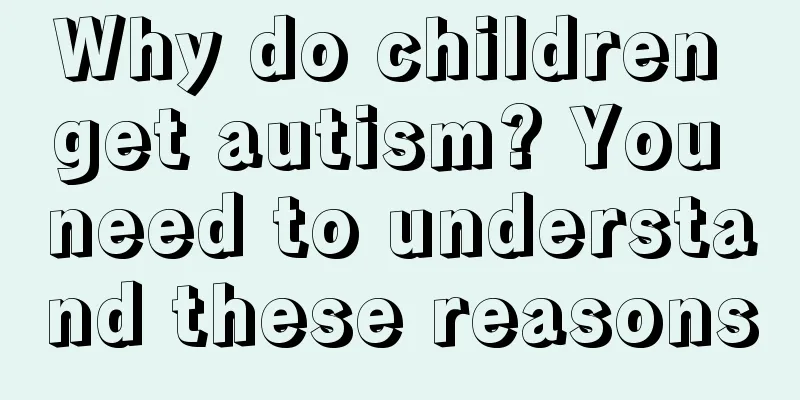What causes anemia in breastfed babies?

|
For the nutritional health of the baby, many women adopt breastfeeding. After 6 months, they will add complementary food to feed. The feeding time is generally more than one year old. However, some children will find it difficult to wean, so they will feed for a longer time. At this time, it will be found that the nutrition of milk is poor and can no longer meet the normal growth of the baby. Some babies will have anemia. So what is the cause of anemia in breastfed babies? Although the digestion and absorption rate of breast milk is very high, the iron content is very low. The iron content in 100 grams of breast milk generally does not exceed 0.5 mg, while the iron content in 100 grams of formula milk (powder) can reach 9 mg. Therefore, the longer the exclusive breastfeeding period, the greater the likelihood that the child will develop iron deficiency anemia. Formula milk (powder) rich in iron can effectively prevent iron deficiency anemia in children. Adding iron-rich animal proteins such as meat can also supplement the iron nutrition of infants. Supplement with iron-containing foods, such as iron-fortified infant formula, iron-containing rice flakes, or iron-containing vitamin drops. At the same time, you should also supplement with foods rich in vitamin C, such as tomato juice, vegetable puree, etc., to enhance iron absorption. In addition, when the baby starts eating solid food, he should also be fed more foods containing high levels of iron, such as egg yolks, rice porridge, vegetable porridge, etc., but sugar should be avoided because it will hinder the absorption of iron. Analysis of the reasons why breastfeeding leads to a higher incidence of iron deficiency anemia found that breastfeeding leads to iron deficiency anemia in infants and young children mainly due to the following aspects: 1. The mother herself is anemic, and her own physical condition causes anemia in the child. 2. When the child is ready to add complementary foods (usually 4-6 months), but still only eats breast milk, or the amount of complementary foods added is small, or the complementary foods are added improperly, it will cause iron deficiency anemia. Although the digestion and absorption rate of breast milk is very high, far higher than various formula fortified milk products, the iron content in breast milk is very low. The iron content in 100 grams of breast milk generally does not exceed 0.5 mg, while the iron content in 100 grams of formula milk (powder) can reach 5-11 mg. Infants and young children grow very fast. Normally, their weight doubles within 5 months after birth and doubles by 1 year old. After 4-6 months, the iron stored in infants' bodies has been gradually depleted. If infants are only fed with breast milk that is low in iron, or if they are given non-infant formula milk or complementary foods (such as only giving children porridge), iron deficiency anemia may result. 3. Since it is difficult for mothers to judge the amount of food their babies eat each time, if the baby does not eat enough for a long time, it may also cause anemia. 4. Certain factors can affect iron absorption. For example, excessive calcium supplementation can affect iron absorption. It is very likely for breastfed babies to suffer from anemia. During breastfeeding, adults need to eat more nutritious foods and have a diverse choice of foods so that more nutrients can be stored in the body, and breast milk will be more nutritious. Once your baby is found to have anemia, he or she should go to the hospital for a regular blood test to confirm the type and severity of the anemia so that iron can be supplemented accurately, otherwise the anemia will worsen. |
<<: What should a three-month-old baby with anemia eat?
>>: How to treat infants with congenital hypothyroidism
Recommend
What foods can cause early puberty?
Now our living standards are getting higher and h...
What should I do if my baby has chest tightness and sweating when sleeping at night?
For parents, what they hope most is that their ba...
What are the specific symptoms of ADHD in children?
Many parents find that their children cannot sit ...
What causes children to vomit blood?
Children's vomiting blood may be caused by ga...
What is the cause of nutritional iron deficiency anemia in children?
Nutritional iron deficiency anemia in children is...
Is 377 degrees considered a fever for a child?
Under normal circumstances, the body temperature ...
One year old baby convulsions
What is going on when a one-year-old baby is havi...
The harm of the baby hitting the back of the head
The back of the baby's head is the most vulne...
What medicine should children take for acute laryngitis
Laryngitis is a very common disease in daily life...
Children with colds and fevers are always difficult to deal with in an emergency
Many children have poor resistance, so they don&#...
6-year-old teeth have not fallen out and new teeth have grown
During childhood, we need to replace our teeth. T...
Why does a three-month-old baby snore when sleeping?
It is the wish of every mother that the baby can ...
What are the symptoms of a child having a fever and convulsions?
Fever is a common health hazard in children, and ...
Childhood mental illness
For children, because their resistance is relativ...
What's going on when my baby has blue loose stools?
When a mother finds that her baby's stool is ...









